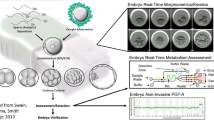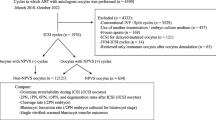Abstract
Purpose
To determine the frequency of and factors associated with a patient being declined from pursuing a cycle of in vitro fertilization with autologous oocytes (IVF-AO).
Methods
A cross-sectional study using a nationwide cohort of female respondents aged 35 or over, who visited a US fertility clinic from 1/2015 to 3/2020, responded to the online FertilityIQ questionnaire (http://www.fertilityiq.com). All respondents were asked if they were previously declined from pursuing a cycle of IVF-AO. Examined demographic and clinical predictors included age, race/ethnicity, education, income, clinic type, care received in a mandated state, insurance coverage for fertility treatment, and self-reported infertility diagnosis. Logistic regression was used to calculate the adjusted odds ratios for factors associated with being declined from pursuing IVF-AO.
Results
Of 8660 women who met inclusion criteria, 418 (4.8%) reported previously being declined a cycle of IVF-AO. In the multivariate analysis, predictors of being declined from pursuing IVF-AO included increasing age, income of less than $50,000, and diagnoses of poor oocyte quality and diminished ovarian reserve. Predictors of being less likely to report decline included some college or college degree and diagnoses of male factor, unexplained or tubal infertility. Notably, diagnosis of PCOS or residence in a state with mandated fertility coverage was not predictive of patients being declined from pursuing IVF-AO.
Conclusion
Nearly 5% of patients who pursued IVF reported being declined from pursuing IVF-AO. Further studies are needed to confirm our findings and explore whether patients being declined treatment meet the criteria for futile or very poor prognosis.

Similar content being viewed by others
Data availability
All data and materials as well as software applications comply with field standards.
References
Assisted Reproductive Technology (ART): ART Success Rates. Centers for Disease Control and Prevention. https://www.cdc.gov/art/artdata/index.html. Accessed 29 Oct 2020.
Ethics Committee of the American Society for Reproductive Medicine. Electronic address: asrm@asrm.org; Ethics Committee of the American Society for Reproductive Medicine. Fertility treatment when the prognosis is very poor or futile: an Ethics Committee opinion. Fertil Steril. 2019;111(4):659–63.
FertilityIQ: About Us. FertilityIQ. https://www.fertilityiq.com/about-us. Accessed 29 Oct 2020.
Ferraretti AP, et al. ESHRE consensus on the definition of ‘poor response’ to ovarian stimulation for in vitro fertilization: the Bologna criteria. Hum Reprod (Oxford, England). 2011;26(7):1616–24.
Van Voorhis BJ. Clinical practice. In vitro fertilization. N Engl J Med. 2007;356:379–86.
Boshara R, Emmons WR, Noeth B. The demographics of wealth: how age, education and race separate thrivers from strugglers in today’s economy. Essay No. 2: Education and Wealth, May 2015
Mosalanejad L, et al. Barriers to infertility treatment: an integrated study. Glob J Health Sci. 2013;6(1):181–91. https://doi.org/10.5539/gjhs.v6n1p181.
Funding
No funding was obtained for this study.
Author information
Authors and Affiliations
Contributions
All authors contributed to the study conception and design. Material preparation, data collection, and analysis were performed by EH, JM, and AP. The first draft of the manuscript was written by EH and all authors commented on previous versions of the manuscript. All authors read and approved the final manuscript.
Corresponding author
Ethics declarations
Conflict of interest
Jake Anderson-Bialis and Deborah Anderson-Bialis are owners and cofounders of FertilityIQ. All other authors report no conflicts of interest/competing interests.
Ethical approval
This study was considered exempt from IRB approval.
Consent to participate
No identifiable data was used in this study so consent for specific individuals was not obtained.
Additional information
Publisher's Note
Springer Nature remains neutral with regard to jurisdictional claims in published maps and institutional affiliations.
Rights and permissions
About this article
Cite this article
Hariton, E., Morris, J.R., Portugal, A. et al. Prevalence and characteristics of patients declined from pursuing in vitro fertilization with autologous oocytes. J Assist Reprod Genet 38, 2679–2685 (2021). https://doi.org/10.1007/s10815-021-02287-x
Received:
Accepted:
Published:
Issue Date:
DOI: https://doi.org/10.1007/s10815-021-02287-x




